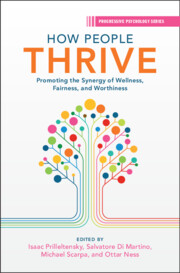Book contents
- How People Thrive
- The Progressive Psychology Book Series
- How People Thrive
- Copyright page
- Contents
- Figures
- Tables
- Contributors
- Chapter 1 Thriving as the Synergy of Wellness, Fairness, and Worthiness
- Chapter 2 Thriving within Ourselves: Epistemic Injustice and Individual Wellness
- Chapter 3 Thriving Families and Friendships
- Chapter 4 Thriving in Context: Wellness, Fairness, and Worthiness in Diverse Groups
- Chapter 5 Thriving Schools: Creating Equitable Thriving within Schools
- Chapter 6 Thriving Workplaces: Wellness, Fairness, and Worthiness at Work
- Chapter 7 Thriving Communities
- Chapter 8 Thriving Societies
- Chapter 9 Thriving World
- Index
- References
Chapter 9 - Thriving World
Published online by Cambridge University Press: 14 November 2024
- How People Thrive
- The Progressive Psychology Book Series
- How People Thrive
- Copyright page
- Contents
- Figures
- Tables
- Contributors
- Chapter 1 Thriving as the Synergy of Wellness, Fairness, and Worthiness
- Chapter 2 Thriving within Ourselves: Epistemic Injustice and Individual Wellness
- Chapter 3 Thriving Families and Friendships
- Chapter 4 Thriving in Context: Wellness, Fairness, and Worthiness in Diverse Groups
- Chapter 5 Thriving Schools: Creating Equitable Thriving within Schools
- Chapter 6 Thriving Workplaces: Wellness, Fairness, and Worthiness at Work
- Chapter 7 Thriving Communities
- Chapter 8 Thriving Societies
- Chapter 9 Thriving World
- Index
- References
Summary
Humankind has entered the Anthropecene era. The world faces numerous threats to the survival of humanity and other species. While diverse disciplines have risen to meet global challenges, psychology has largely focused on individual aspects such as cognition, emotion, and behavior. This chapter aims to support psychology in adapting to global challenges by introducing a novel tool, the panological model. This model comprehensively accounts for the complex relationships between multiple levels of analysis. The first part of the chapter introduces the core characteristics and innovations of the panological model, which seeks to expand upon Uri Bronfenbrenner’s bio-ecological model. These advancements include: a paradigm shift from anthropocentrism to ecocentrism, a new systemic vision, and a redefiniton of the role of time. The second part of the chapter combines the model with the principles of global fairness, wellness, and worthiness. This integration shows how psychology can gain a deeper understanding of macro-level phenomena, enabling it to address pressing global challenges like international conflicts, pandemics, and environmental sustainability.
Information
- Type
- Chapter
- Information
- How People ThrivePromoting the Synergy of Wellness, Fairness, and Worthiness, pp. 261 - 287Publisher: Cambridge University PressPrint publication year: 2024
